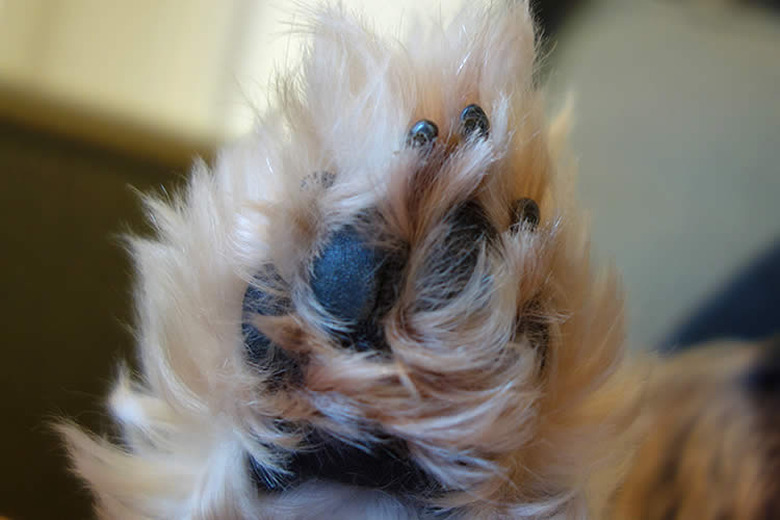Should I Put Lotion On My Dog's Paws?
The pads on your dog's paws are much tougher than human skin. They can take on all sorts of terrain without damage and don't need tender loving care to stay healthy. In some circumstances applying lotion might help your dog, but in most cases it's best to leave the pads alone so they stay tough enough to keep your pal comfortable.
Normal Wear and Tear
Under normal circumstances you don't need to apply lotion to your dog's paws. As he walks, runs and plays he will build up calluses on the pads of his feet that provide protection during regular activity. Although these calluses feel dry and coarse, they're supposed to be that way. The thick skin lets him run easily over rocks, cement, gravel, pine needles and other rough surfaces that would hurt our tender feet. As long as he doesn't suddenly become more active and his paws aren't damaged, your dog doesn't need lotion applied to the pads.
Cracks
Small surface cracks on your dog's pads are normal, but deep cracks could signal that they are too dry and need moisturizing treatment. If you notice cracks appearing, or chafing that seems to be irritating your dog, start applying cream. Choose a lotion made specifically for dogs, or use vitamin E cream. Some lotions made for human skin contain ingredients that are irritating to dogs or that may soften the pads too much and make them susceptible to injury. Rub the lotion completely into the pads so that nothing's left behind for your dog to lick.
Heat and Cold
Extreme temperatures can damage your dog's paws, even if he is used to walking for miles on hard surfaces. Heat is absorbed by asphalt and concrete surfaces and can burn your dog's feet as he walks. Ice, snow and frigid sidewalks, on the other hand, can cause extreme dryness and even frostbite. Special protective lotions are available that create a barrier that stops damage and lets your dog travel on hot or cold surfaces for short stretches. Apply the protective cream before contact with such surfaces. Protective lotion may be used in conjunction with dog boots for longer walks.
Infection
Sharp objects like glass, nails and thorns can puncture the pads on your dog's paws. Sometimes these wounds will heal on their own without incident, but they can become infected, and if they do it may be necessary to apply an antibiotic lotion. Check with your veterinarian, who can examine and diagnose an infection in your dog's paws. Keep the pads clean and apply the antibiotic lotion as often as recommended by your veterinarian.
Allergies
Contact allergies, which are triggered by direct contact with an allergen like grass, weeds, carpet cleaners or floor wax, can cause your dog's paws to become itchy, irritated, swollen, chafed and even cracked. Since it's not always possible to avoid these allergens, the next best thing is to clean your dog's paws immediately after contact and apply an antihistamine lotion. The lotion will help reduce the itching so that your dog will not chew and pick at his feet, which could lead to bigger problems.
By Carlye Jones
References
AKC Canine Health Foundation: Keeping Dogs' Paws Healthy
Cesar's Way: Ask the Vet: Winter Proofing Your Dog's Paws
ASPCA: Top 10 Paw Care Tips for Dogs
About the Author
Carlye Jones is a journalist, writer, photographer, novelist and artisan jeweler with more than 20 years of experience. She enjoys sharing her expertise on home improvements, photography, crafting, business and travel. Her work has appeared both in print and on numerous websites.
